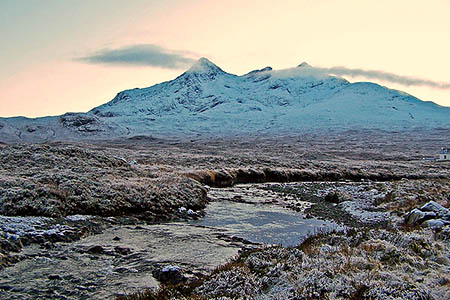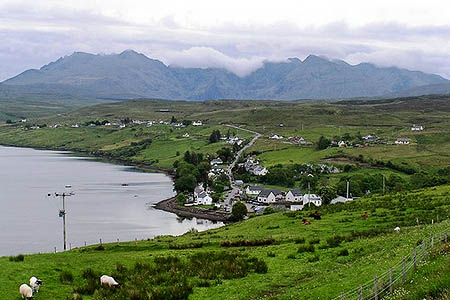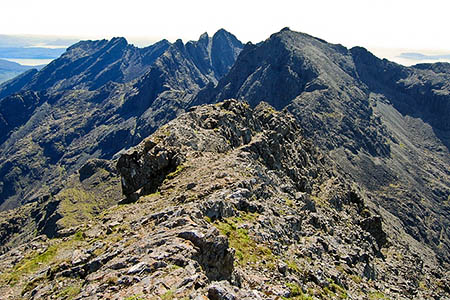
Graham Paterson was a seasoned mountaineer who knew the Cuillin well. Photo: Richard Dorrell CC-BY-SA-2.0
The Scottish Government should consider regulating mountain guides, a sheriff said.
Sheriff Derek Pyle made the recommendation following a fatal accident inquiry into the death of Graham Paterson almost two years ago on the Isle of Skye.
Mr Paterson, who had 20 years mountaineering experience and was a former member of the Skye Mountain Rescue Team, was fatally injured in a fall on the Cuillin in December 2012, while he was guiding a Bristol teacher on a route in Coire na Banachdich on Sgurr Dearg.
The 60-year-old, from Carbost on Skye, had been hired by Ildiko Kerek to take her on a hillwalking trip in the Cuillin. Although she was a hillwalker, and had undertaken routes in the Lake District, the Pyrenees and Kilimanjaro, she had only once used crampons in winter, and had no experience on technical winter routes and did not know how to use an ice-axe.
Mr Paterson fell while the pair were ascending a grade IV climb in the corrie and received chest injuries that led to his death.
Delivering his determination into the incident, Sheriff Pyle, himself an experienced hillwalker, said ‘consideration should be given by Scottish Government and relevant stakeholders to discovering a means, whether statutory or otherwise, to ensure that mountain guides in Scotland are properly qualified and equipped to provide a commercial mountain guiding service for adults’.
Although commercial trekking and climbing activities for the under 18s are covered by legislation covering competence, there is no legal requirement for those leading and instructing adults in the UK to have relevant qualifications.
Sheriff Pyle said: “It seems to me that it is incumbent on policy-makers to discover a means by which mountain guides in Scotland are properly qualified and equipped to provide the service which they promote and which they operate for commercial gain.”
The sheriff said Ms Kerek contacted the mountain guide through his website and arranged the trip with him. At the start she said she had brought a map but Mr Paterson told her that it would not be needed, so he left it behind in her car.

Mr Paterson ran his guiding business from Carbost, in the shadow of the Cuillin. Photo: Stuart Wilding CC-BY-SA-2.0
Describing the events on 27 December, Sheriff Pyle said: “Before leaving, Mr Paterson told his wife, Annie Paterson that it was his intention to take Ms Kerek to Sgurr na Banachdich as far as the snow-line.
“He said that he would telephone or text her when he and Ms Kerek reached the furthest point of their walk. If he had no signal he would telephone or text her as soon thereafter as he could.
“This was the standing arrangement which he made when taking clients on a walk or climb. That arrangement included the understanding that if he did not return by dusk Mrs Paterson would contact the mountain rescue service unless he had forewarned her that he would arrive later than that time.”
Ms Kerek told Mr Paterson she didn’t want anything that was challenging and that she ‘did not do cliffs’.
Sheriff Pyle said the weather and visibility deteriorated and it started snowing. “They began climbing up a gully with a frozen waterfall,” he said. “The gully slope was covered in ice and snow. They were both using their crampons and ice axes.
“Ms Kerek complained that it was too steep and difficult for her. She said that she wanted to go back down. She began to do so, but immediately noticed that Mr Paterson had slipped and began falling very rapidly down the slope.
“The slope which Mr Paterson and Ms Kerek were climbing when the accident happened was a technical climbing route which was grade IV in winter conditions. The route was wholly unsuitable for a novice climber like Ms Kerek.”
The teacher managed to climb back down the gully. Sheriff Pyle said: “Ms Kerek was very frightened. Nevertheless, albeit with considerable difficulty, she managed to retreat downwards and eventually found Mr Paterson behind a rock. He was in a kneeling position.
“It was obvious to her that he was badly injured. She said that she would go for assistance. She asked him which mountain they were on but he was unable to speak in reply. One of his hands was uncovered. She tried to cover it with a woollen glove.”
Unknown to Ms Kerek, her guide had punctured a lung in the fall, which would eventually lead to his death.
The sheriff praised her for her tenacity in making her way down the mountain in bad visibility and with no map. An expert witness to the inquiry said: “It is to her credit that she was able to remain in a mental state, never mind a physical one, to find safety.” The sheriff added she was lucky to have survived the ordeal herself.
Eventually she managed to make her way back to the car and the alarm was raised, but because she had no idea where the incident had taken place, it took mountain rescuers three days to find Mr Paterson’s body.
Sheriff Pyle said: “I have reached certain conclusions which are critical of what Mr Paterson did. I do not do so lightly, not least because I run the risk of adding to the grief and feelings of loss which his widow and family must be suffering.
“But in my judgment I have to face up to that task to ensure that lessons are learned for the future in the hope that the circumstances of this case do not arise again.
“The underlying cause of the risks to which she was exposed was the unregulated nature of mountain guiding in Scotland.
“During the course of the evidence of Niall Miller who is a principal inspector of the Health and Safety Executive, I discussed with him various options for possible reform, including the introduction of a statutory regime of registration of commercial providers of outdoor activities for adults, including mountain guiding.
“Questions were raised about the practicality of such a regime, not least because of cultural resistance from the hillwalking and climbing community. I do not consider that the limited nature of the evidence over a two-day fatal accident inquiry would entitle me to come to any firm conclusions or to make any specific recommendations.
“It seems to me that it is incumbent on policy-makers to discover a means by which mountain guides in Scotland are properly qualified and equipped to provide the service which they promote and which they operate for commercial gain.
“Lessons should also be learned by hillwalkers and climbers generally. In saying that, I should declare that I have been a hillwalker myself for over 40 years. I well understand Mr [Robert] Telfer’s description of some of the benefits being the sense of freedom or challenge.”
Mr Telfer, depute head of inspection of the Adventure Activities Licensing Service, also gave evidence to the inquiry.
Sheriff Pyle said: “There is, in my view, little difference between that attitude and the one which complained that motor cyclists should not be required to wear crash helmets.
“This inquiry illustrates what can happen if the leader of a party, particularly a small one, has an accident. It is, in my view, insufficient for only the leader to have all the equipment necessary for safe passage.
“One other within the group should be similarly equipped. That would include such basic equipment as a torch and a bivvy shelter, which each member of the group should have, a whistle, a map, and a compass – albeit that would not work in the Cuillin.
“Each member of the group should be clear about the proposed route, including escape routes in the event of an emergency.”
The sheriff also said consideration should be given to carrying a satellite phone or device such as Spot emergency alarm.
Concluding, he said: “Mr Paterson, I can surmise, loved his job. I have no reason to think that he set out with the aim of causing his client to be faced with unnecessary risks.
“I have however concluded that he made errors of judgment. That ought to be the extent of the criticism which he now receives. I did not have the benefit of hearing from Mrs Paterson.
“There is, however, a reference in the papers before me that it is some comfort to her that he died on the mountains he loved. Whether one ventures or not into the hills of Scotland, it is easy to sympathise with that sentiment. I give my condolences to her and her family for their loss.”
Further information can be seen in Sheriff Pyle’s determination.
